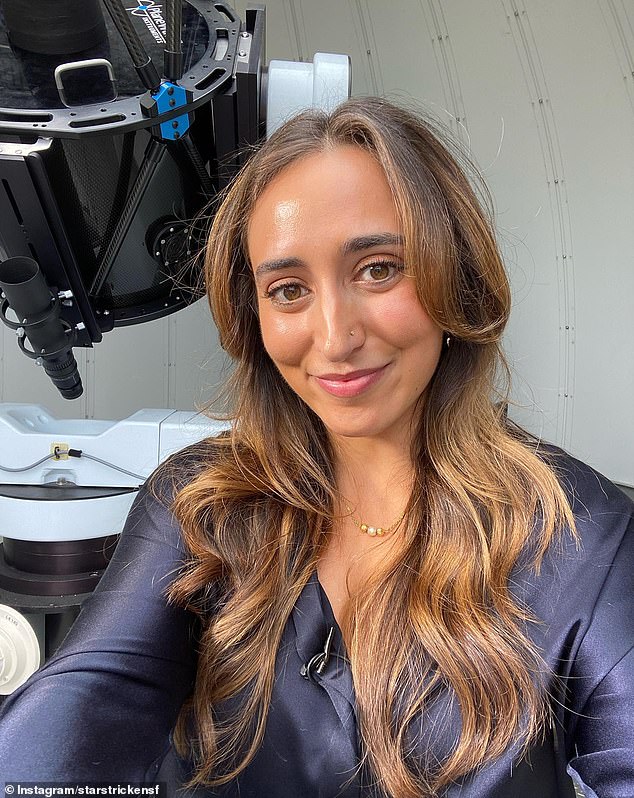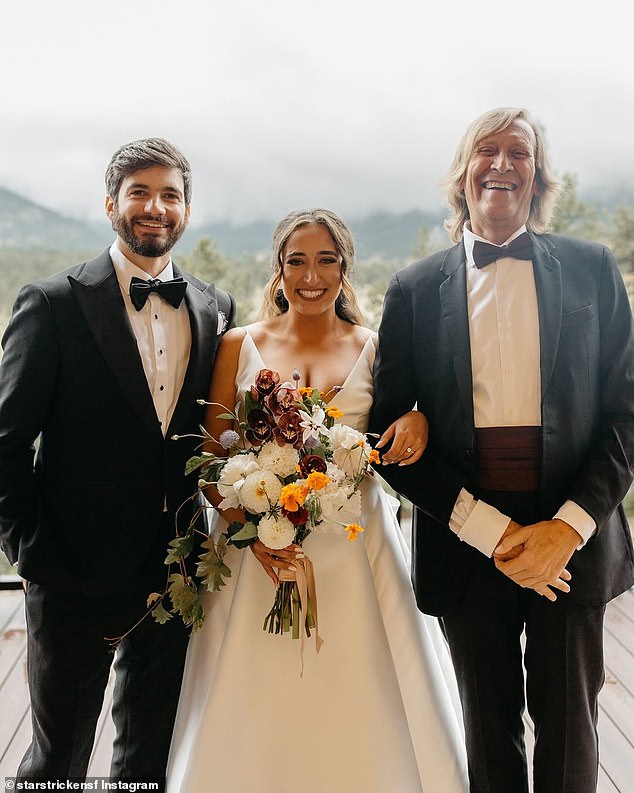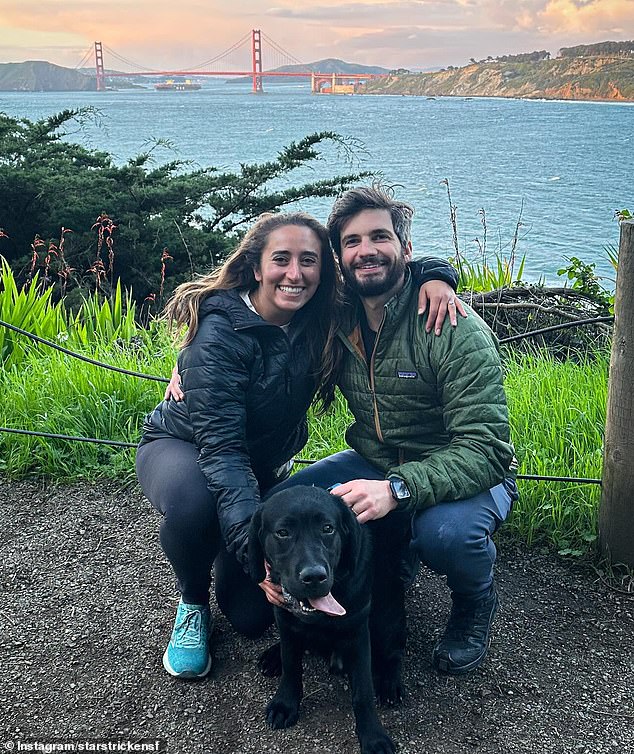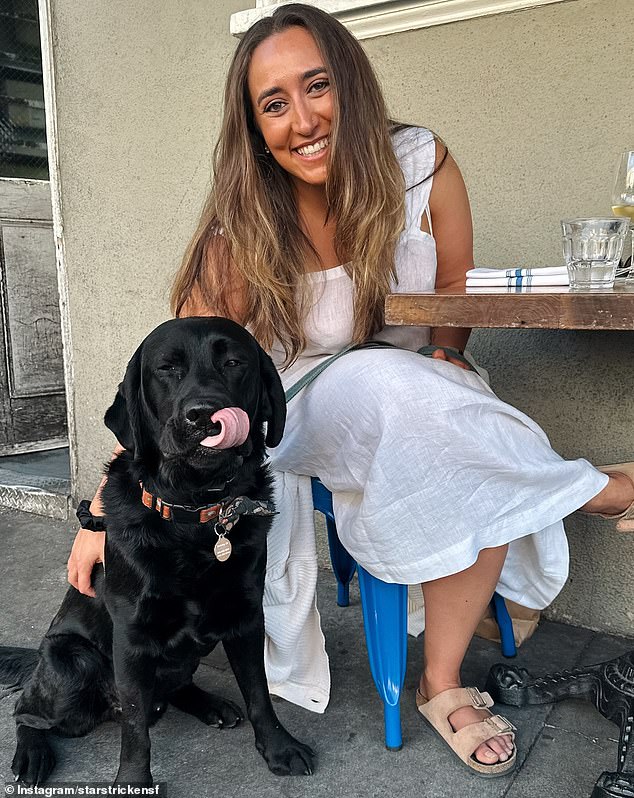She was fit and healthy, with her whole life ahead of her.
But at the age of 23, Sarafina Nance had to put everything on pause when her father was diagnosed with stage 4 prostate cancer – and she learned what that might mean for her future.
He was 58 when they discovered the cancer. Its rapid progression alarmed his oncologist.
As Sarafina’s dad underwent treatment, the specialist took her aside and said four words that would change her life.
‘We recommend genetic testing.’
The oncologist explained that because of how quickly the cancer had grown – combined with her grandmother’s history of both ovarian and pancreatic cancer – there was a high chance Sarafina had inherited mutated genes that would significantly increase her risk of developing the disease.
‘It was so overwhelming,’ Sarafina, now 32, tells me.
‘I took a year off to be with my dad when he was sick and decided it was best to get genetically tested.’ It was a wise decision.

Sarafina Nance discovered she was a carrier of the BRCA gene mutation at the age of 23

She underwent genetic testing at the recommendation of her father’s oncologist. (Sarafina is pictured, centre, on her wedding day with husband Taylor, left, and her father, right)
‘I was at work when I got the call about my results,’ she says.
She was a carrier of the BRCA gene mutation – which increases chances of developing a range of cancers, including breast cancer and ovarian cancer.
‘Dad developed stage 4 cancer just six months after he first started showing symptoms. It was really aggressive, which I’ve learned is a hallmark of BRCA-associated cancers.’
For Sarafina, the diagnosis meant she had an 87 per cent lifetime risk of breast cancer, a 30 per cent lifetime risk of ovarian cancer, and an elevated risk of both pancreatic cancer and melanoma.
Unsure of how to handle the news, Sarafina called her friend Taylor – the man she would later marry – and he drove to her work to pick her up.
‘As soon as I got in the car, I cried. He was there to support me and was reassuring about it all,’ she says.
‘It was kind of serendipitous. It was the first day he became a part of this BRCA journey I’m on.’
Sarafina booked an appointment with a genetic counsellor, but struggled to process the significance of being a BRCA gene carrier while her father was still so sick.

To avoid passing on the BRCA gene to her children, Sarafina and her husband Taylor have decided to go down the path of IVF rather than conceive naturally

‘The fact that my future child won’t have to worry about cancer the way I do now is life-changing. It’s honestly the greatest relief of my life and I feel very lucky,’ says Sarafina
‘I lived in denial for a year or two. I moved to San Francisco for grad school and I didn’t know what to do with the information,’ she says.
‘My dad was still in treatment and I was trying not to think of myself.
‘The guidelines said to start monitoring from age 25, so I thought I had a couple of years to not worry about it. Then, when I turned 25, I went to a clinic that specialises in hereditary cancers.’
CATCHING CANCER BEFORE IT HAPPENS
What followed was an onslaught of testing – from mammograms to breast MRI scans, to ovary ultrasounds – all to check for any abnormalities.
‘There were about six different cancers they were trying to catch. One time, I had 11 doctors’ appointments in a week to try to manage it all,’ Sarafina says.
But it was only the beginning.
The first breast MRI found a small lump that terrified Sarafina. She worried this was what the rest of her life was going to look like.
‘I thought to myself, “I can’t live like this. It’s horrible for my mental health. I’m living in fear,”‘ she says.
A biopsy confirmed the lump was benign – but, given her genetic mutation, Sarafina wasn’t taking any chances.
‘I said to myself, “I don’t want to wait to get cancer.” It didn’t feel right to me. So I had a preventative double mastectomy in November 2019, then a breast reconstruction in July 2020,’ she tells me.
‘It was a mindset shift of taking something that felt inevitable and being able to transform that into something where I got to decide how I’m living.’
The decision reduced her risk of developing breast cancer from 87 per cent to less than five per cent.
To reduce her risk of ovarian cancer, Sarafina will need to have her ovaries removed eventually, which she will only do once she has had children.
As Sarafina took preventative steps, her dad finished his cancer treatment in January.
He is now in remission, and Sarafina hopes he will still be around to meet his future grandchildren.
Sarafina and Taylor, who began dating in 2018, spoke about having children early on – but because her genetic mutation is hereditary, they have decided to try IVF.
This will ensure they don’t pass on the mutated genes to their children.
The couple married in 2023 and began the IVF process that year.
The treatment will cost them between AU$38,000-$45,800, but it’s a price they’re willing to pay to know their kids will be born without the mutation.
‘We got two BRCA-free, chromosomally normal embryos. The most recent round I did in February are also two BRCA-free embryos. And they’re all boys,’ she says.
They plan to have the embryos implanted in the next 12 months – and are reassured knowing they have done everything possible to protect the next generation.
‘The fact that my future child won’t have to worry about cancer the way I do now is life-changing,’ Sarafina says.
‘It’s honestly the greatest relief of my life and I feel very lucky.’
In 2023, Sarafina released a book titled Starstruck: A Memoir of Astrophysics and Finding Light in the Dark.












